| Listing 1 - 10 of 14 | << page >> |
Sort by
|
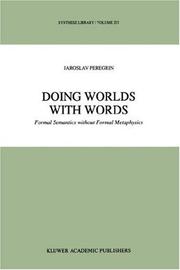
ISBN: 0792337425 9048146186 9401584680 Year: 1995 Publisher: Dordrecht Kluwer
Abstract | Keywords | Export | Availability | Bookmark
 Loading...
Loading...Choose an application
- Reference Manager
- EndNote
- RefWorks (Direct export to RefWorks)
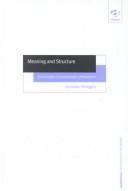
ISBN: 075460411X Year: 2001 Publisher: Aldershot Ashgate
Abstract | Keywords | Export | Availability | Bookmark
 Loading...
Loading...Choose an application
- Reference Manager
- EndNote
- RefWorks (Direct export to RefWorks)
Analysis (Philosophy) --- Structuralism --- Structure (Philosophy) --- Philosophy --- Whole and parts (Philosophy) --- Form (Philosophy) --- Poststructuralism --- Analysis, Linguistic (Philosophy) --- Analysis, Logical --- Analysis, Philosophical --- Analytic philosophy --- Analytical philosophy --- Linguistic analysis (Philosophy) --- Logical analysis --- Philosophical analysis --- Philosophy, Analytical --- Language and languages --- Methodology --- Logical positivism --- Semantics (Philosophy) --- Structuralism. --- Analysis (Philosophy).
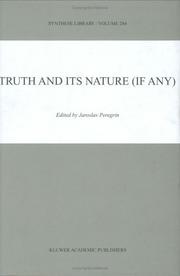
ISBN: 0792358651 9048152801 9401592330 Year: 1999 Publisher: Dordrecht Kluwer
Abstract | Keywords | Export | Availability | Bookmark
 Loading...
Loading...Choose an application
- Reference Manager
- EndNote
- RefWorks (Direct export to RefWorks)
The question how to turn the principles implicitly governing the concept of truth into an explicit definition (or explication) of the concept hence coalesced with the question how to get a finite grip on the infinity of T-sentences. Tarski's famous and ingenious move was to introduce a new concept, satisfaction, which could be, on the one hand, recursively defined, and which, on the other hand, straightforwardly yielded an explication of truth. A surprising 'by-product' of Tarski's effort to bring truth under control was the breathtaking finding that truth is in a precisely defined sense ineffable, that no non trivial language can contain a truth-predicate which would be adequate for the very 4 language . This implied that truth (and consequently semantic concepts to which truth appeared to be reducible) proved itself to be strangely 'language-dependent': we can have a concept of truth-in-L for any language L, but we cannot have a concept of truth applicable to every language. In a sense, this means, as Quine (1969, p. 68) put it, that truth belongs to "transcendental metaphysics", and Tarski's 'scientific' investigations seem to lead us back towards a surprising proximity of some more traditional philosophical views on truth. 3. TARSKI'S THEORY AS A PARADIGM So far Tarski himself. Subsequent philosophers then had to find out what his considerations of the concept of truth really mean and what are their consequences; and this now seems to be an almost interminable task.
Truth --- Language and languages—Philosophy. --- Epistemology. --- Logic. --- Semantics. --- Modern philosophy. --- Philosophy of Language. --- Modern Philosophy. --- Modern philosophy --- Formal semantics --- Semasiology --- Semiology (Semantics) --- Comparative linguistics --- Information theory --- Language and languages --- Lexicology --- Meaning (Psychology) --- Argumentation --- Deduction (Logic) --- Deductive logic --- Dialectic (Logic) --- Logic, Deductive --- Intellect --- Philosophy --- Psychology --- Science --- Reasoning --- Thought and thinking --- Epistemology --- Theory of knowledge --- Methodology
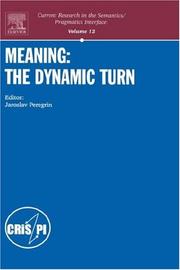
ISBN: 0080441874 9004454144 Year: 2003 Publisher: Amsterdam Elsevier
Abstract | Keywords | Export | Availability | Bookmark
 Loading...
Loading...Choose an application
- Reference Manager
- EndNote
- RefWorks (Direct export to RefWorks)
Discourse analysis --- Grammar, Comparative and general --- Semantics --- Semantics (Philosophy) --- Intension (Philosophy) --- Logical semantics --- Semantics (Logic) --- Semeiotics --- Significs --- Syntactics --- Unified science --- Language and languages --- Logic, Symbolic and mathematical --- Logical positivism --- Meaning (Psychology) --- Philosophy, Modern --- Semiotics --- Signs and symbols --- Symbolism --- Analysis (Philosophy) --- Definition (Philosophy) --- Formal semantics --- Semasiology --- Semiology (Semantics) --- Comparative linguistics --- Information theory --- Lexicology --- Syntax --- Discourse grammar --- Text grammar --- Lexicology. Semantics --- Pragmatics --- Linguistics --- Philology --- Grammar, Comparative and general Syntax
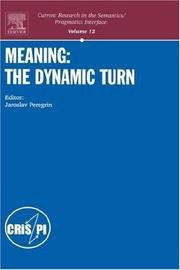
ISBN: 9789004454149 9780080441870 Year: 2003 Publisher: Leiden; Boston : BRILL
Abstract | Keywords | Export | Availability | Bookmark
 Loading...
Loading...Choose an application
- Reference Manager
- EndNote
- RefWorks (Direct export to RefWorks)
In recent decades, many theories of formal semantics of natural language have undergone what can be called a dynamic turn: they have moved from treating language as a static system to considering it 'in action' and to taking meanings as crucially involving 'context-change potentials'. The theories, however, usually concentrate much more on the hows of the turn than on its whys; and as a result, the conceptual foundations of dynamic semantics are much less elaborated than its technical side. This book, based on a conference held in Prague in September 2001, is a contribution to filling this gap: it consists of papers addressing, from various sides, the foundational questions of the dynamic theories of meaning. It includes contributions of writers who are commonly held as authorities concerning the turn, who, however, here concentrate more on the why's than on the how's of dynamic semantics. Hence the book should be of interest both for those who want to know what the turn is about, and for those who are not satisfied with knowing the technical side of dynamic semantics and want to know its point.
Discourse analysis --- Grammar, Comparative and general --- Semantics (Philosophy) --- Syntax
Book
ISBN: 9780367405632 Year: 2020 Publisher: Abingdon, Oxon ; New York : Routledge,
Abstract | Keywords | Export | Availability | Bookmark
 Loading...
Loading...Choose an application
- Reference Manager
- EndNote
- RefWorks (Direct export to RefWorks)
This book addresses the hasty development of modern logic, especially its introducing and embracing various kinds of artificial languages and moving from the study of natural languages to that of artificial ones. This shift seemed extremely helpful and managed to elevate logic to a new level of rigor and clarity. However, the change that logic underwent in this way was in no way insignificant, and it is also far from an insignificant matter to determine to what extent the "new logic" only engaged new and more powerful instruments to answer the questions posed by the "old" one, and to what extent it replaced these questions with new ones. Hence, this movement has generated brand new kinds of philosophical problems that have still not been dealt with systematically. Philosophy of Logical Systems addresses these new kinds of philosophical problems that are intertwined with the development of modern logic. Jaroslav Peregrin analyzes the rationale behind the introduction of the artificial languages of logic; classifies the various tools which were adopted to build such languages; gives an overview of the various kinds of languages introduced in the course of modern logic and the motifs of their employment; discusses what can actually be achieved by relocating the problems of logic from natural language into them; and reaches certain conclusions with respect to the possibilities and limitations of this "formal turn" of logic. This book is both an important scholarly contribution to the philosophy of logic and a systematic survey of the standard (and not so standard) logical systems that were established during the short history of modern logic.
Book
ISBN: 9788024618159 Year: 2007 Publisher: Praha Univerzita Karlova v Praze ; Nakladatelství Karolinum
Abstract | Keywords | Export | Availability | Bookmark
 Loading...
Loading...Choose an application
- Reference Manager
- EndNote
- RefWorks (Direct export to RefWorks)
Book
ISBN: 8070075171 9788070075173 Year: 2017 Publisher: Prague (Czech Republic) Filosofia
Abstract | Keywords | Export | Availability | Bookmark
 Loading...
Loading...Choose an application
- Reference Manager
- EndNote
- RefWorks (Direct export to RefWorks)


ISBN: 3110324083 9783110324082 3937202242 9783937202242 1904632130 9781904632139 9783110323818 3110323818 Year: 2013 Publisher: Berlin Boston
Abstract | Keywords | Export | Availability | Bookmark
 Loading...
Loading...Choose an application
- Reference Manager
- EndNote
- RefWorks (Direct export to RefWorks)
Die Philosophie wurde von so unterschiedlichen Philosophen wie Wolff und Russell als Möglichkeitswissenschaft bezeichnet. Doch erwiesen sich die modalen Konzepte von Möglichkeit und Notwendigkeit als sperrig und vieldeutig, und ihr Verhältnis zum Wirklichkeitsbegriff bleibt problematisch. Die vorliegende Sammlung beleuchtet die Metaphysik und Logik von Möglichkeit und Wirklichkeit aufs Neue und betrachtet sie aus unterschiedlichsten Perspektiven jenseits der Dichotomie von analytischer und kontinentaler Philosophie. Die Philosophiegeschichte (von der griechischen Antike bis zu David Lewis) kom
Possibility. --- Reality. --- Metaphysics. --- Logic. --- Argumentation --- Deduction (Logic) --- Deductive logic --- Dialectic (Logic) --- Logic, Deductive --- Intellect --- Philosophy --- Psychology --- Science --- Reasoning --- Thought and thinking --- God --- Ontology --- Philosophy of mind --- Truth --- Nominalism --- Pluralism --- Pragmatism --- Logic --- Methodology
Digital

ISBN: 9783110324082 9783110323818 Year: 2013 Publisher: Berlin ;; Boston De Gruyter
Abstract | Keywords | Export | Availability | Bookmark
 Loading...
Loading...Choose an application
- Reference Manager
- EndNote
- RefWorks (Direct export to RefWorks)
| Listing 1 - 10 of 14 | << page >> |
Sort by
|

 Search
Search Feedback
Feedback About UniCat
About UniCat  Help
Help News
News